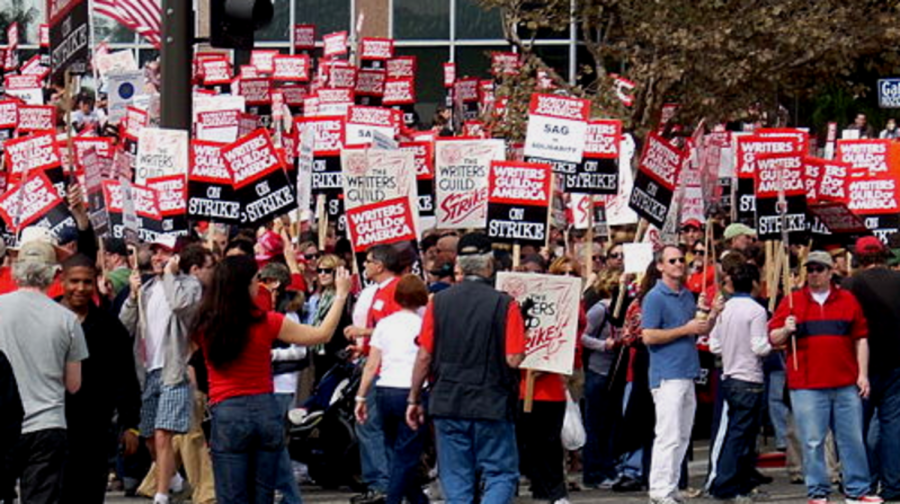WGA Strikers Shut Down Hollywood
After failing to reach a contractual agreement with Alliance of Motion Picture and Television Producers (AMPTP), the powerful Writers Guild of America (WGA) union went on strike on May 2. As the first WGA strike since 2007, the movement will likely have massive ramifications on the entertainment industry and treatment of scriptwriters all over the country.
Because film and TV have largely switched over to streaming, as opposed to the traditional cable television format or in-theater movie releases, the way screenwriters have been compensated and treated for their work has transformed. In the past, writers would be paid thousands of dollars for cable reruns of TV episodes or films they wrote (payments known as “residuals”), which would support writers while their shows were in post-production or off-air. But now, writers are being paid just cents for a rewatch on a streaming service–even those who were involved in creating wildly successful, award-winning series.
“I have friends who believe, ‘Oh, Alex worked on The Bear, Alex is rich now. Alex can buy a car,’” writer Alex O’Keefe told The A.V. Club. “And you know, I’m not. I’m broke. [When] I won the WGA Award for Outstanding Comedy Series, I had a negative bank account.”
WGA members–over 10,000 people, 98% of whom voted for the strike–are also calling for an end to “mini-rooms”, where writers are contracted to hastily write an entire first season of a show before the series is even green-lit. With only a few writers, an entire season needing to be written in advance, and a tight timeline for creation, production companies can pay writers less. Many streaming TV shows tend to have short seasons, usually with no more than 10 episodes, due to mini-rooms. With traditional TV, there are just writers’ rooms where writers are generally contracted for longer periods of time and compensated better for their time, which, uncoincidentally, is what strikers are largely calling to re-establish.
“What essentially happens is you can work for 10, 12 weeks on a project at a lower rate,” writer and actor Franchesca Ramsey explained on The Root. “And then there’s no guarantee that your show will even go to air. So you’ve now essentially put time into a project, but no one’s gonna see it; it is not on your resume and didn’t pay you a lot of money.”
Strikers are also calling for limits to the use of artificial intelligence in the screenwriting industry, fearing that the use of AI could allow studios to keep writers employed for even shorter periods of time and pay them even less.
“I don’t put it past these companies to try [to]… have an [AI] output text and hire writers to rewrite it or something like that,” WGA negotiating committee member and TV personality Adam Conover said to Deadline. “I think the public will hate it. I think it’d be a financial failure, but I think they might try and they could hurt a lot of writers by doing so.”
The strike itself has left Hollywood unmoored, with late night shows like “The Jimmy Kimmel Show” and “Saturday Night Live” halted as writers wait for producers to signal that they are willing to renegotiate. Additionally, TV series in pre-production like “Abbott Elementary” and “Cobra Kai” have closed their writers’ rooms, both because of workers striking in solidarity with WGA members.
“We hate to strike, but if we must, we strike hard,” the co-creator of the Netflix show, Jon Hurwitz, said on Twitter. “Pencils down in the Cobra Kai writers room. No writers on set. These aren’t fun times, but it’s unfortunately necessary. The moment a fair deal is in place, we’ll get back... In the meantime, sending strength and support to the negotiating committee.”
The process could take months — WGA’s last strike lasted from November 2007 to February 2008. Still, writers are standing strong, pulling out witty picket signs as they march in Los Angeles: “You’re gonna be the villains in a limited series about this!” “Let’s replace studio execs with AI!” “Give up just one yacht!”
The last picket sign’s quote references how strikers are calling, collectively, for about a $250 million raise in compensation for writers; according to WGA, 49% of screenwriters are being paid their minimum rate. Executives have argued that companies are not making enough money to raise the compensation of writers so highly; in the meantime, CEOs like Warner Brothers president David Zaslav have been making over $200 million a year.
“That’s about the same level as what 10,000 writers are asking him to pay all of us collectively,” Conover said on CNN.
Many have noticed the saturation of film and TV in recent years — there seem to be thousands of new series and movies popping up every year, and yet the quality is worsening. This is not because of writers becoming less creative or passionate, but instead, it’s because of executives grinding them down and barely compensating them. The WGA strike may shut down production temporarily, but if the union clinches a deal that benefits the writers and gives them more time and money to create amazing things, it would improve not only the things people watch, but the lives of those behind the scenes, too.



